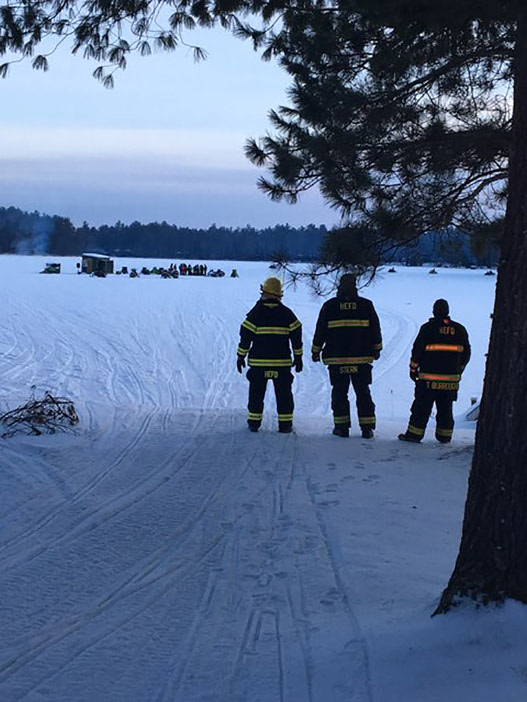Highlands East firefighters stood shore-bound as citizens and EMS gathered around a snowmobiler injured on the ice of Benoir Lake Jan. 12.
The firefighting service remains shore only and lacks ice rescue training, according to Highlands East acting fire
chief Chris Baughman. This is despite the municipality receiving approximately $18,562 in 2017 from a GoFundMe campaign to get ice rescue training in the wake of the death of cottager Bob Bell, who died after his snowmobile went through the ice on Dark Lake.
Baughman confirmed his department was on the scene Jan. 12 and said they would have taken the risk to intervene had EMS not arrived at the same time.
“At the time we didn’t feel it necessary to put any more people on the ice. We are shore-based only but with the fire service we will risk, not necessarily safety, but will extend the amount of risk we will take if necessary,” he said.
But the GoFundMe money remains set aside and unspent, Baughman said, because the province does not have a recognized ice-training rescue course.
“As soon as we have the option to use that money for what it was donated, then we would like to do so,” Baughman said. “I can’t change it. I would like to see it sooner rather than later, but without an approved course form the province, I have nothing to back us up as far as training and certification and documentation to prove that we have the training.”
The lack of courses is a result of a 2017 inquest into the deaths of Adam Brunt and Gary Kendall, two firefighters who died during ice-rescue training. The inquest recommended the province halt all regulated and unregulated ice/cold water training exercises in any “swift” currents. The Office of the Fire Marshall and Emergency Management subsequently put ice/cold water rescue programs on hiatus, according to Legislative Assembly of Ontario records.
Ministry of Community Safety and Correctional Services spokesperson Brent Ross said a curriculum for ice rescue training is under development.
“The Ontario Fire College is developing the curriculum for a revised ice rescue training course, which is can’t change it. I would like to see it sooner rather than later, but without an approved course form the province, I have nothing to back us up as far as training and certification and documentation to prove that we have the training.”
Baughman said he was not personally on scene Jan. 12 and could not provide details on what occurred with the injured person on the ice. County of Haliburton chief/director of community services Tim Waite said regulations prevented him from discussing specifics on a call.
The Highlands East fire department is not the only one lacking ice-rescue training due to the lack of courses. Dysart et al fire chief Mike Iles said it is an issue for all municipalities.
“Until this new course comes out and training begins, all municipalities will struggle with the do’s and don’ts of water rescue,” he said in an email. “Ultimately it comes down to the safety of the firefighter and the job they are performing.”





